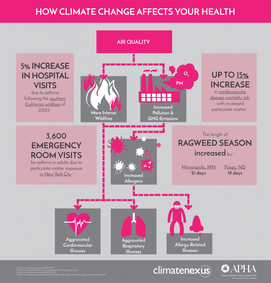 When someone with asthma inhales dangerous particles from the atmosphere, they could have life-threatening asthma attacks. Air pollution can increase the number of allergens in the air, putting people with allergies at risk. These conditions can affect just about anyone, even those who do not pollute the air, as the quality of air cannot be controlled by an individual. It is controlled by the sum of what individuals contribute. People can make decisions to help decrease air pollution. Some examples are opting to walk or bike to your destination instead of driving (especially if it is close by), carpooling, taking the bus, and buying fewer products made using fossil fuels. The local government can also contribute by using solar energy and wind turbines to power things instead of using fossil fuels. They can also plant more trees and enforce waste reduction. Reducing air pollution is difficult, but with the effort of the community, it is possible to achieve. A clean atmosphere is essential to not only the preservation of our environment but also for the public's well-being. Bibliography “Air Pollution.” World Health Organization, World Health Organization, www.who.int/westernpacific/health-topics/air-pollution. Barry Saxifrage | Analysis, Energy |July 13th 2017, et al. “These 'Missing Charts' May Change the Way You Think about Fossil Fuel Addiction.” National Observer, 13 July 2017, www.nationalobserver.com/2017/07/13/analysis/these-missing-charts-may-change-way-you-think-about-fossil-fuel-addiction. “How Air Quality & Pollution Impact Public Health.” Climate Nexus, 28 Oct. 2019, https://climatenexus.org/climate-issues/air-quality/ Comments are closed.
|
|

